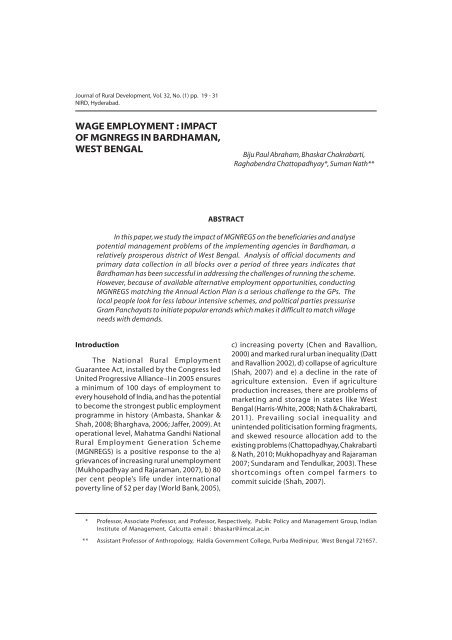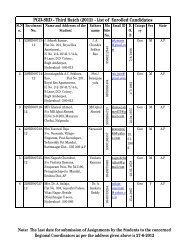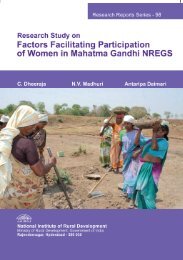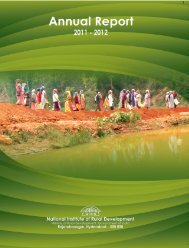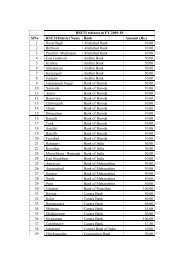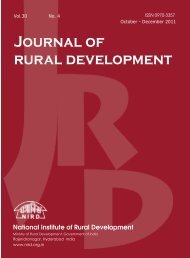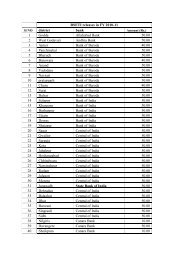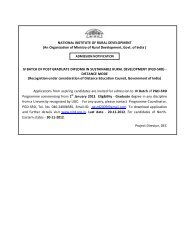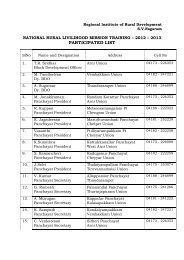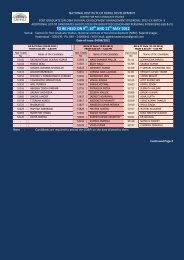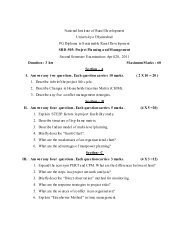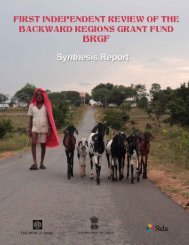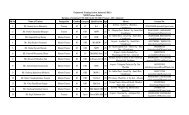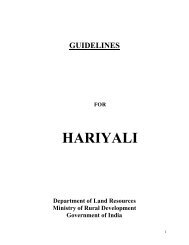Journal <strong>of</strong> <strong>Rural</strong> <strong>Development</strong>, Vol. 32, No. (1) pp. 19 - 31NIRD, Hyderabad.WAGE EMPLOYMENT : IMPACTOF MGNREGS IN BARDHAMAN,WEST BENGALBiju Paul Abraham, Bhaskar Chakrabarti,Raghabendra Chattopadhyay*, Suman Nath**ABSTRACTIn this paper, we study the impact <strong>of</strong> MGNREGS on the beneficiaries and analysepotential management problems <strong>of</strong> the implementing agencies in Bardhaman, arelatively prosperous district <strong>of</strong> West Bengal. Analysis <strong>of</strong> <strong>of</strong>ficial documents andprimary data collection in all blocks over a period <strong>of</strong> three years indicates thatBardhaman has been successful in addressing the challenges <strong>of</strong> running the scheme.However, because <strong>of</strong> available alternative employment opportunities, conductingMGNREGS matching the Annual Action Plan is a serious challenge to the GPs. Thelocal people look for less labour intensive schemes, and political parties pressuriseGram Panchayats to initiate popular errands which makes it difficult to match villageneeds with demands.IntroductionThe <strong>National</strong> <strong>Rural</strong> EmploymentGuarantee Act, installed by the Congress ledUnited Progressive Alliance–I in 2005 ensuresa minimum <strong>of</strong> 100 days <strong>of</strong> employment toevery household <strong>of</strong> India, and has the potentialto become the strongest public employmentprogramme in history (Ambasta, Shankar &Shah, 2008; Bharghava, 2006; Jaffer, 2009). Atoperational level, Mahatma Gandhi <strong>National</strong><strong>Rural</strong> Employment Generation Scheme(MGNREGS) is a positive response to the a)grievances <strong>of</strong> increasing rural unemployment(Mukhopadhyay and Rajaraman, 2007), b) 80per cent people’s life under internationalpoverty line <strong>of</strong> $2 per day (World Bank, 2005),c) increasing poverty (Chen and Ravallion,2000) and marked rural urban inequality (Dattand Ravallion 2002), d) collapse <strong>of</strong> agriculture(Shah, 2007) and e) a decline in the rate <strong>of</strong>agriculture extension. Even if agricultureproduction increases, there are problems <strong>of</strong>marketing and storage in states like WestBengal (Harris-White, 2008; Nath & Chakrabarti,2011). Prevailing social inequality andunintended politicisation forming fragments,and skewed resource allocation add to theexisting problems (Chattopadhyay, Chakrabarti& Nath, 2010; Mukhopadhyay and Rajaraman2007; Sundaram and Tendulkar, 2003). Theseshortcomings <strong>of</strong>ten compel farmers tocommit suicide (Shah, 2007).* Pr<strong>of</strong>essor, Associate Pr<strong>of</strong>essor, and Pr<strong>of</strong>essor, Respectively, Public Policy and Management Group, Indian<strong>Institute</strong> <strong>of</strong> Management, Calcutta email : bhaskar@iimcal.ac.in** Assistant Pr<strong>of</strong>essor <strong>of</strong> Anthropology, Haldia Government College, Purba Medinipur, West Bengal 721657.
20 Biju Paul Abraham, Bhaskar Chakrabarti, Raghabendra Chattopadhyay, Suman NathThe <strong>National</strong> Sample Survey Dataindicate that West Bengal is low in ranking interms <strong>of</strong> education, poverty and health andnutrition. The State has high levels <strong>of</strong> nutritionaldeprivation, alarming poverty head count,stagnation in human development ranking andlow female participation in decision-makingprocesses (Sengupta and Gazder, 1997; Sen,2002; Ghosh, 2002; Macroscan, 2003). TheHuman <strong>Development</strong> Report shows one <strong>of</strong> thehighest differences in rural and urbanconsumption rate in West Bengal. People’sparticipation is alarmingly low in villagedevelopment meetings (Chattopadhyay,Chakrabarti & Nath, 2010).MGNREGS, with its triple underlyingobligations <strong>of</strong> a) creation <strong>of</strong> durable assets, b)strengthening the livelihood resource base <strong>of</strong>the rural poor, and c) providing training forupgradation <strong>of</strong> the skills <strong>of</strong> unskilled labourers(Chakraborty, 2007) is an unique opportunityto heal the existing maladies. With mammothfund devolution, MGNREGS is also expectedto rejuvenate local governance institutions(MoRD, 2008).In this paper, we explore MGNREGS atoperational level in the Bardhaman district <strong>of</strong>West Bengal. Bardhaman (literally means‘developing’) with a population <strong>of</strong> 6.9 millionin 2001 census, is an important hub foragricultural production (GoWB, n.d). Thedistrict has 50 per cent higher rate <strong>of</strong>agriculture growth than West Bengal as a State,as a result <strong>of</strong> its inclusion in 1961’s IntensiveAgricultural District Programme, 1975’s HighYielding Variety Programme aided byDamodar and Ajay river networks <strong>of</strong> irrigation,substantiated by groundwater exploitation inthe 1980’s (Harris White, 2008; Moitra and Das,2004). Industrial growth in adjacent Durgapur,coalmines in nearby Ranigunj add toalternative employment opportunity <strong>of</strong> thedistrict. In consequence, less demand forMGNREGS work is evident in some areas. Inspite <strong>of</strong> this, our study shows that maximumnumber <strong>of</strong> days <strong>of</strong> employment providedrange between 91 to 100 days for forwardvillages, and 61-70 days for backward villages.In MGNRERS, Bardhaman is ranked first inexpenditure per Gram Panchayat, second onbasis <strong>of</strong> percentage <strong>of</strong> persondays achieved,third in percentage <strong>of</strong> BPL Households whohave been provided employment (http://nregsburdwan.com).Bardhaman being one <strong>of</strong> the prosperousdistricts should ideally require less MGNREGSsupport and therefore, success <strong>of</strong> continuingsuch a programme depends on ‘successfulmanagement’ <strong>of</strong> the programme.Consequently, our research attempts tounderstand the impact <strong>of</strong> MGNREGS over itsparticipants, as well as explores the challengesto MGNREGS and management responses toaddress such challenges.MGNREGS : Reflections from LiteratureMGNREGS’s potential to effectivelyaddress poverty-related issues is wellrecognised (Dreze and Sen, 1989; Ravallion,1991; Besley and Coate, 1992; Sen, 1995). Theexisting literature indicates that MGNREGSfrom its commencement faced problems <strong>of</strong>implementation because <strong>of</strong> imperfect design.Associated is the problem <strong>of</strong> determiningwages high enough to meet daily needs, butnot higher than the prevailing rate (Papola,2005). Other issues <strong>of</strong> concern include nonpayment,gender and caste biasedunderpayment (Chakrabarti, 2007; Khera andNayak, 2009; Khosla, 2011).A substantive understanding <strong>of</strong> the issuescreating bottlenecks for implementingMGNREGS at the operational level isimperative. Studies indicate two broaddifficulties in implementation <strong>of</strong> MGNREGS.First, the fiscal challenges. These primarilyinclude wage determination and cash transfer.Second, management problems with theimplementing agencies. These includeJournal <strong>of</strong> <strong>Rural</strong> <strong>Development</strong>, Vol. 32, No. 1, <strong>January</strong> - <strong>March</strong> : <strong>2013</strong>JRD 2 (1)
- Page 2 and 3: Journal ofRural DevelopmentVol. 32
- Page 4 and 5: Journal of Rural Development, Vol.
- Page 6 and 7: Small and Medium Enterprises In the
- Page 8 and 9: Small and Medium Enterprises In the
- Page 10 and 11: Small and Medium Enterprises In the
- Page 12 and 13: Small and Medium Enterprises In the
- Page 14 and 15: Small and Medium Enterprises In the
- Page 16 and 17: Small and Medium Enterprises In the
- Page 18 and 19: Small and Medium Enterprises In the
- Page 20: Small and Medium Enterprises In the
- Page 25 and 26: 22 Biju Paul Abraham, Bhaskar Chakr
- Page 27 and 28: 24 Biju Paul Abraham, Bhaskar Chakr
- Page 29 and 30: 26 Biju Paul Abraham, Bhaskar Chakr
- Page 31 and 32: 28 Biju Paul Abraham, Bhaskar Chakr
- Page 33 and 34: 30 Biju Paul Abraham, Bhaskar Chakr
- Page 36 and 37: Journal of Rural Development, Vol.
- Page 38 and 39: Socio-Economic Impoverishment Risks
- Page 40 and 41: Socio-Economic Impoverishment Risks
- Page 42 and 43: Socio-Economic Impoverishment Risks
- Page 44 and 45: Socio-Economic Impoverishment Risks
- Page 46 and 47: Socio-Economic Impoverishment Risks
- Page 48 and 49: Socio-Economic Impoverishment Risks
- Page 50 and 51: Journal of Rural Development, Vol.
- Page 52 and 53: Empowerment from the Above - Respon
- Page 54 and 55: Empowerment from the Above - Respon
- Page 56 and 57: Empowerment from the Above - Respon
- Page 58 and 59: Empowerment from the Above - Respon
- Page 60 and 61: Empowerment from the Above - Respon
- Page 62: Empowerment from the Above - Respon
- Page 65 and 66: 62 Rashmi Tiwari and Sanatan Nayaka
- Page 67 and 68: 64 Rashmi Tiwari and Sanatan NayakT
- Page 69 and 70: 66 Rashmi Tiwari and Sanatan NayakT
- Page 71 and 72:
68 Rashmi Tiwari and Sanatan Nayakc
- Page 73 and 74:
70 Rashmi Tiwari and Sanatan NayakT
- Page 75 and 76:
72 Rashmi Tiwari and Sanatan NayakU
- Page 77 and 78:
74 Rashmi Tiwari and Sanatan Nayak2
- Page 79 and 80:
76 Arijit Royincreasing temperature
- Page 81 and 82:
78 Arijit RoyS is land size (in big
- Page 83 and 84:
80 Arijit RoyThe number of cattle p
- Page 85 and 86:
82 Arijit RoyThe role of Panchayats
- Page 87 and 88:
84 Arijit Royper cent. β2 is signi
- Page 90 and 91:
Journal of Rural Development, Vol.
- Page 92 and 93:
Extent of People’s Participation
- Page 94 and 95:
Extent of People’s Participation
- Page 96 and 97:
Extent of People’s Participation
- Page 98 and 99:
Extent of People’s Participation
- Page 100 and 101:
Book Journal Reviews of Rural Devel
- Page 102 and 103:
Book Reviews 99poverty, between agr
- Page 104 and 105:
Book Reviews 101areas. The authors
- Page 106 and 107:
Book Reviews 103the changes in the
- Page 108 and 109:
Book Reviews 105In Chapter five the
- Page 110 and 111:
Journal of Rural Development(Quarte
- Page 112:
3. An article published in an edite


